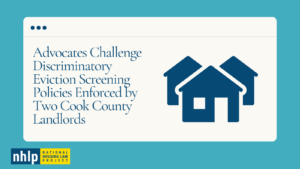Advocates Challenge Discriminatory Eviction Screening Policies Enforced by Two Cook County Landlords
Eviction Screening Policies Are a Discriminatory Practice, that Particularly Harm
Black Women and Their Families
CHICAGO, Ill. – In two historic filings, housing advocates are challenging policies of two large landlords in Cook County, Il. that automatically reject applicants who have any prior connection to an eviction case, alleging the policies discriminate against Black renters, especially Black women, in violation of the 1968 Fair Housing Act. These “No-Evictions” policies shut out families from housing opportunities even when the eviction case was dismissed or was filed years ago.
Legal Aid Chicago filed a federal lawsuit today against Hunter Properties, Inc., arguing that Hunter’s “No-Evictions” policy has a disparate impact based on race, as well as on race and sex. Hunter’s website makes clear that “Prior eviction filings will result in denial” of housing applications, resulting in discrimination against Black renters, especially Black women. The lawsuit also claims that Hunter’s practice of excluding potential tenants based on sealed eviction records violates Illinois state law prohibiting unfair residential leasing practices.
While Black people of all genders make up just 33% of Cook County renters, Black people were approximately 56% of the individuals from September 2010 to March 2023 either served with an eviction case by the Sheriff’s Office or evicted by the Sheriff’s Office. Black women alone accounted for approximately 33% of those served or evicted despite making up just 22% of all renters in Cook County. Black renters faced nearly triple the likelihood of experiencing an eviction case than non-Black renters.
“It’s time that we take the stigma out of eviction filings,” said Dennericka Brooks, Director of the Housing Practice Group at Legal Aid Chicago. “Blanket policies of housing providers that deny housing to, or prevent families from even applying for housing, have a cascading negative impact on families of color. These policies lock families out of housing while simultaneously ushering in opportunity to abuse, harass, or intimidate families with the mere threat of having an eviction filed against them. No family should be denied real housing choice because of a mere court filing against them. It’s time that we start demanding that housing providers see people as people and remove policies that are known to disparately impact women of color and perpetuate segregation.”
In addition, HOPE Fair Housing Center (HOPE) filed a civil rights complaint with the U.S. Department of Housing and Urban Development against Oak Park Apartments, one of the largest operators of rental housing in Oak Park, IL. The complaint argues that Oak Park Apartments’ “No-Evictions” policy both discriminates against Black renters and Black women renters and perpetuates and reinforces residential segregation.
“For over 50 years, Oak Park has worked hard to intentionally develop and grow an inclusive, integrated community,” said Michael Chavarria, HOPE’s Executive Director. “Landlords obstructing that hard work by placing barriers to housing for its residents, specifically for Black women, should be held accountable for their actions.”
The two cases are among the first in the nation to challenge eviction screening policies as discriminatory. Legal Aid Chicago is represented in the suit by the American Civil Liberties Union, the ACLU of Illinois, Mayer Brown, and the National Housing Law Project (NHLP). HOPE Fair Housing Center is represented in its complaint by the ACLU, the ACLU of Illinois, and NHLP.
“The law needs to recognize how use of these screening policies uniquely harms Black women as they seek housing for themselves and their families,” said Emily Werth, Senior Staff Attorney at the ACLU of Illinois. “Given the pernicious history of housing discrimination in Chicago and across Cook County, it is critical to address this continuing driver of discrimination and segregation.”
“Fair housing is a pillar of our fight for systemic equality, and eviction screening policies are an active threat to that equality,” said Sandra Park, Senior Staff Attorney at the ACLU’s Women’s Rights Project. “These blanket bans lock out millions of renters because they were connected to an eviction case, even when they won or it occurred years ago. They prolong the trauma of eviction and especially destabilize Black women and families by trapping them in poverty. Communities are safer and stronger when everyone has equal access to housing, and we’re determined to oppose these harmful policies in Cook County and across the country.”
“Once the CDC’s nationwide eviction moratorium ended, an estimated 30 to 40 million people, who were disproportionately Black households and Black women, were at risk of eviction due to the COVID-19 housing crisis,” said Shamus Roller, executive director of the National Housing Law Project. “Those disparities serve as another potent example of the stark racial inequities and racial wealth gap in this country. That these evictions are used in a blanket way to exclude individuals and families from housing is both unjust and unlawful.”
“Mayer Brown is proud to represent Legal Aid Chicago and to work alongside the ACLU and the National Housing Law Project to advance this federal litigation challenging the discriminatory and devastating impact that having an eviction record imposes on Black people, and particularly Black women, in Cook County,” said Brian Massengill, a partner at Mayer Brown LLP. “Housing and economic stability is a core pillar of the firm’s Project Equity initiative—we will continue to handle matters that ensure fair and equitable housing for all.
Read the ACLU and Hope Fair Housing’s blog post about How Eviction Brands Renters With a Scarlet Letter.

